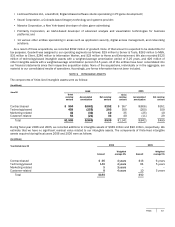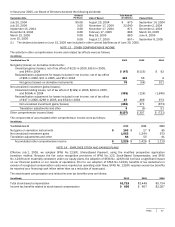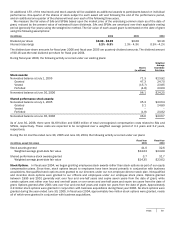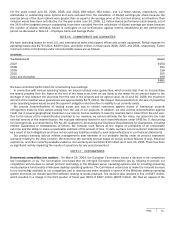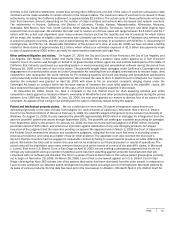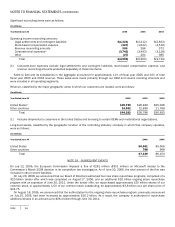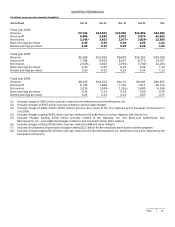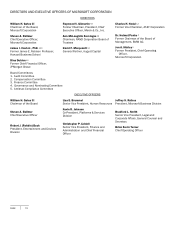Microsoft 2006 Annual Report Download - page 63
Download and view the complete annual report
Please find page 63 of the 2006 Microsoft annual report below. You can navigate through the pages in the report by either clicking on the pages listed below, or by using the keyword search tool below to find specific information within the annual report.
PAGE 62
NOTES TO FINANCIAL STATEMENTS (CONTINUED)
decision to the Court of First Instance on June 6, 2004. On December 22, 2004, the Court ordered that we must comply with
the decision pending review on appeal and we are taking steps to ensure we are in compliance. The hearing on the appeal
occurred in April 2006. We continue to contest the conclusion that European competition law was infringed and will defend our
position vigorously. In December 2005, the Commission issued a Statement of Objections that preliminarily concluded we were
not in full compliance with the 2004 decree. In March 2006, the Commission conducted an oral hearing on the Statement of
Objections and our response to the Statement. On July 12, 2006, the European Commission announced its determination that
we had not complied with the technical documentation requirements of the 2004 Decision, and levied a fine of €281 million
($351 million). We will appeal this fine to the Court of First Instance.
On December 7, 2005, the Korean Fair Trade Commission (“KFTC”) announced a ruling in its investigation of us, holding that
we abused a market dominant position and engaged in unfair trade practices under the Korean Fair Trade Law by incorporating
instant messaging and media player functionality into the Windows PC operating system, and streaming media technologies into
the Windows server operating system. The KFTC also announced the imposition of remedies, including a fine of approximately
$34 million. The KFTC issued its formal written ruling and corrective order on February 23, 2006. The KFTC held that our
integration of Windows Media Player and Windows Messenger in Windows PC operating systems and integration of Windows
Media Services in Windows server operating systems constituted an abuse of monopoly power and unlawful tying in violation of
the Korean Fair Trade Act. Under the order, which became effective August 24, 2006, we can no longer distribute Windows in
Korea as currently designed. We are required to develop and distribute in Korea versions of Windows XP and its successors that
do not include Windows Media Player or Windows Messenger functionality. In addition, we also may distribute a second
modified version of Windows that contains the removed functionality, provided the second version includes promotional links in
the user interface that will enable consumers to link to and download a select group of competing media players and instant
messengers. We have appealed the KFTC’s decision to the Seoul High Court. On May 22, 2006, the KFTC denied our motion for
reconsideration of its ruling. As part of that decision, the KFTC dropped the element of its ruling that prohibited us from
including Windows Media Player or Windows Messenger, or any feature with similar functionality, in any product other than the
Windows client operating system for which we have a 50% or greater market share. On August 23, 2006, we announced the
release to manufacture of the mandated versions of Windows XP Home Edition and Windows XP Professional Edition.
In other ongoing investigations, various foreign governments and several state Attorneys General have requested information
from us concerning competition, privacy, and security issues.
Antitrust, and unfair competition, and overcharge class actions. A large number of antitrust and unfair competition class
action lawsuits have been filed against us in various state and federal courts on behalf of variously defined classes of direct and
indirect purchasers of our PC operating system and certain software applications products. The federal cases have been
consolidated in the U.S. District Court for Maryland. These cases allege that we competed unfairly and unlawfully monopolized
alleged markets for operating systems and certain software applications, and they seek to recover alleged overcharges for these
products. To date, courts have dismissed all claims for damages in cases brought against us by indirect purchasers under
federal law and in 18 states. Ten of those state court decisions have been affirmed on appeal. There was no appeal in five
states. In addition, courts in two states refused to certify classes, essentially bringing the litigation to a close. Claims under
federal law brought on behalf of foreign purchasers have been dismissed by the U.S. District Court in Maryland as have all
claims brought on behalf of consumers seeking injunctive relief under federal law. The ruling on injunctive relief and the ruling
dismissing the federal claims of indirect purchasers were appealed to the United States Court of Appeals for the Fourth Circuit,
together with a ruling denying certification of certain proposed classes of U.S. direct purchasers. On April 18, 2006, the Court of
Appeals affirmed the trial court decision dismissing the indirect purchaser claims. Courts in 18 states have ruled that indirect
purchaser cases may proceed as class actions. In 2003, we reached an agreement with counsel for the California plaintiffs to
settle all claims in 27 consolidated cases in that state. Under the settlement, class members will be able to obtain vouchers
that entitle the class members to be reimbursed up to the face value of their vouchers for purchases of a wide variety of
platform-neutral computer hardware and software. The total value of vouchers issued will depend on the number of class
members who make a claim and are issued vouchers. Two-thirds of the value of vouchers unissued or unredeemed by class
members will be made available to certain schools in California in the form of vouchers that also may be redeemed for cash
against purchases of a wide variety of platform-neutral computer hardware, software, and related services. We also have
reached similar agreements to settle all claims in a number of other states. The settlements in these states are structured



